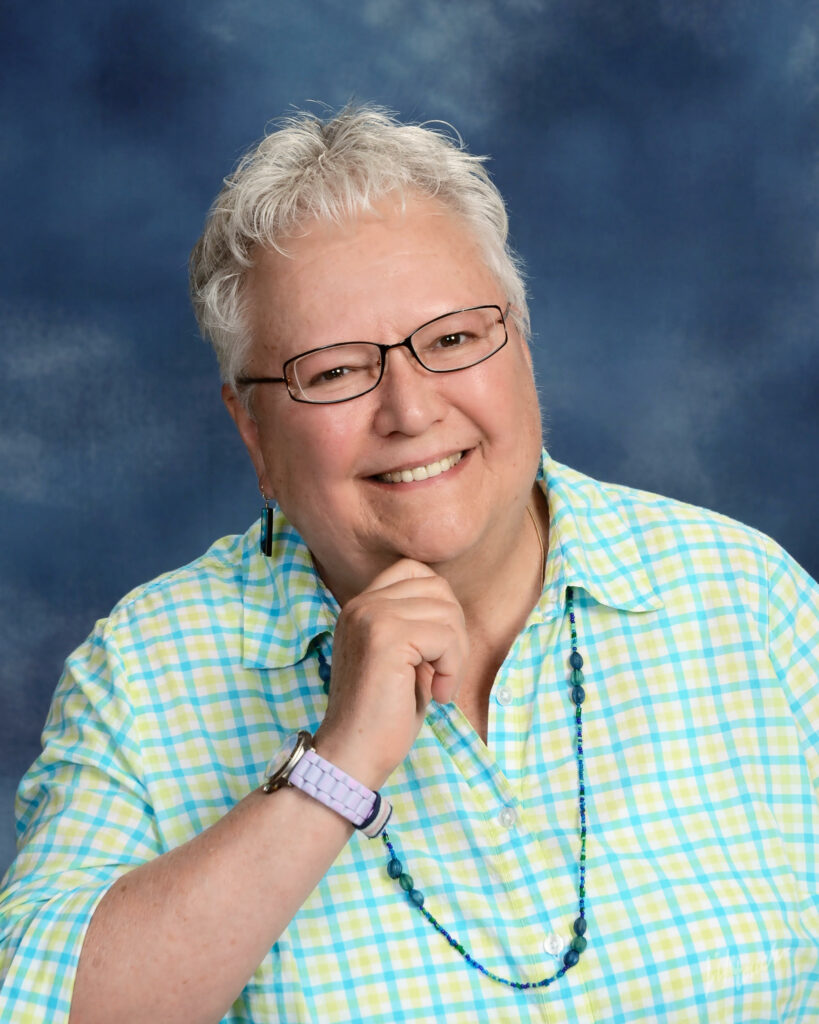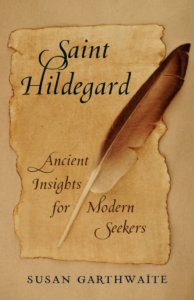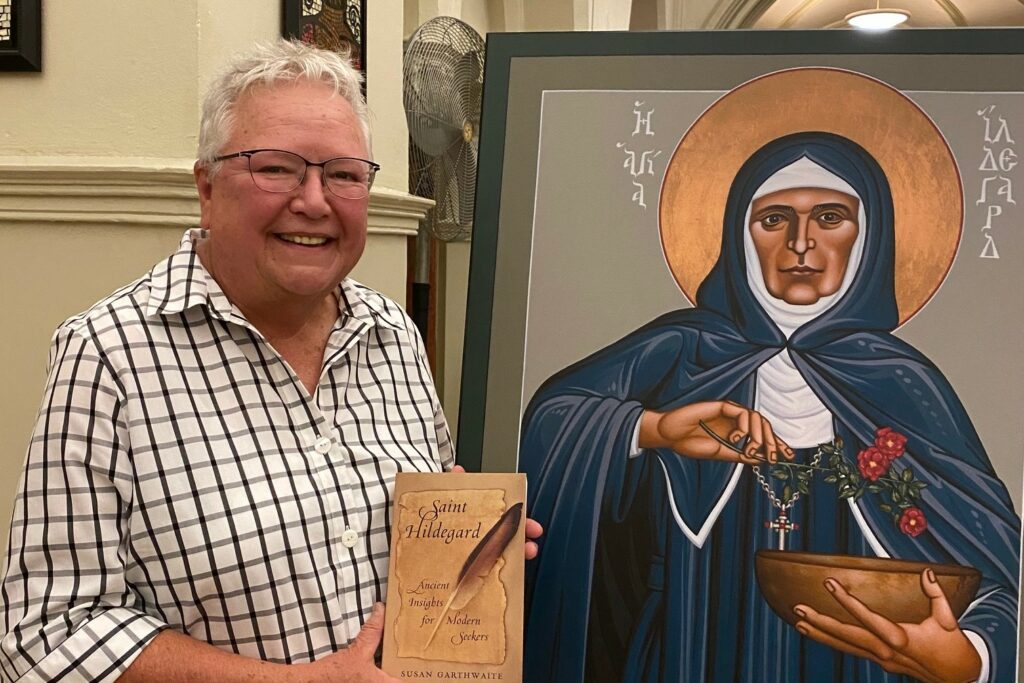Today, I continue my ongoing series of conversations with published authors as I’m joined by Susan Garthwaite, the author of the wonderful new biography Saint Hildegard: Ancient Insights for Modern Seekers. I must admit that even with as much as I’ve written on and spoken about the lives of the saints, Susan’s work on St. Hildegard of Bingen was entirely new for me. I loved reading and praying with this book. After my hearing my conversation with Susan, I hope you’ll check it out too. Enjoy! Lisa

Q: Susan, congratulations on the publication of your new book Saint Hildegard: Ancient Insights for Modern Seekers. Please briefly introduce yourself to our readers.
Thank you, Lisa. What a pleasure to chat with you! I’m a spiritual director, spiritual writer, retreat leader, and spirituality speaker in the Chicago area. Formerly I worked as a scientist and team leader working on new cardiovascular medicines, so I’m in a second career in a way. I’m a great fan of the women doctors of the Church and became especially focused on St. Hildegard of Bingen.
Q: You call St. Hildegard your “wise and steadfast collaborator” on this project. What initially drew you to her and how has her spiritual friendship landed you where you are right now in your journey?
Yes, she’s the culprit in where I am right now!
I chanced upon St. Hildegard when I was working on a heart failure project. I’d run across some lore about her treating people who had heart problems with foxglove, the plant that is the source of digitalis. In her time the abbeys were the hospitals, so perhaps the story was true. My team picked her as the patron of our heart failure project—it was a difficult project, and we were up for some holy support. But I really didn’t know much about her spiritual wisdom at that point. Then I discovered her incredible music, and I was really intrigued. We played her music at a prayer service we had for the patients in our clinical trials.
After I retired from research, I got invited to do a reflection day featuring St. Hildegard, so I began to seriously read her original works. I found so many amazing spiritual insights! I personally benefited from those, but so did the reflection day attendees, and my spiritual direction folks. There were books about St. Hildegard that were very informative but intended for an academic readership. After some discernment, I felt called to be the author who would bring her spiritual insights to the fore, so I set off on that journey.
I discovered a Hildegard I hadn’t known before and developed a spiritual friendship with her. It has often felt like she had been waiting for me and was now helping me. Her writing necessarily entered my writing, so it became a collaboration. She brought her wisdom to bear on the spiritual narratives I provided.

Q: In the book, you offer three unique pathways: becoming a “seeker”, becoming “the faithful friend of your soul”, and becoming “the faithful friend of God”. Please say a few words about each of these and how St. Hildegard points the way.
You’re right, those three pathways really define the sections of the book, and I got that structure from St. Hildegard! In science, the structure for our writing is always the same, but in spiritual writing you must come up with one, and she pointed to both the way and the book structure. I’m either a thief or a collaborator!
St. Hildegard poses a bold and honest question: “Is there a God or not?” Her early experiences of God caused her to seek God all her life. The premise of the “seeker” part of the book is that God becomes real to us through our personal experiences. I give some examples to illustrate that point. St. Hildegard chimes in with the conclusion we reached: “The answer comes from the Holy Spirit Who dwells in the person: God is.”
St. Hildegard encourages “be a faithful friend to your soul.” That concept defined the next section of the book. How exactly do we befriend our souls? We explore the spiritual merits of journaling; reading Scripture with various approaches; engaging a spiritual director; finding a prayer style that supports relationship with God, self, and others; and discernment, a decision-making process by which we choose to love.
The last section of the book comes from St. Hildegard’s urging us to “be the special friend of God.” To her, this is about being true to our calling. In this part, we go quite a bit deeper and give examples of how God asserts more palpably in the relationship. We discuss things like deep healing in prayer and mystical experiences, things which happen “as God foresees the need” according to St. Hildegard. God wants friendship with us and helps us get there.
On every topic, there are reflection questions and spiritual direction examples to help the cause of becoming a seeker, befriending the soul, and becoming a friend of God.
Q: You’d already been a follower of this saint, but what greater insights did you learn about St. Hildegard in the writing of this book?
I certainly learned never to underestimate St. Hildegard! She is such a help and inspiration, not to mention an insightful person. The most important thing I grasped is how utterly relevant she is to us today. Her times were so turbulent, and she can help us with the turmoil of our times.
I learned more about the 12th century and the challenges she faced, how extraordinarily creative she was, and how willing she was to stick her neck out and address the injustices of her time. Through her witness, she affirmed me in being bold and revealing myself in the book. To do otherwise was to let her down, and that’s when I realized I had grown to be the sort of friend who just couldn’t do that.
One thing that St. Hildegard says often in her preaching, letters, books, and homilies is “do not be forgetful of God.” That seems so obvious, doesn’t it, Lisa? But if we don’t have a regular prayer life, we might realize one day that we haven’t thought about God in a long time. We’d be missing out on befriending our soul and becoming a friend of God. Your writing is supporting so many people in their prayer lives, and I know St. Hildegard would applaud your efforts big time.
During the pandemic, we haven’t been able to sing together in our congregations and we miss it. St. Hildegard helped me articulate what it is I’m missing and why it’s important to get back to it. She says music brings about a harmony of body and soul, highlights messages we need to hear, and joins us together in community.
St. Hildegard is a master of imagery. I’m not. So, when she says things like “the human being is a house of prayer,” it stops me in my tracks. I’ve been so struck by the importance of that understanding of us. If we all saw ourselves and each other that way it would be a better world wouldn’t it? And that’s just one example, and it is a timeless one.

Q: I have to ask: why is she the unofficial patron saint of brewing? What else about her might surprise us?
Actually, there are several putative patron saints of brewing! Part of the fun of St. Hildegard is that she is multi-faceted, and we can claim her for a myriad of activities.
To explain . . . There are two books attributed to her that she probably didn’t write. She helped compile her own written legacy in a large codex before her death, and she did not include those books. One of them describes the properties of hops and their importance in beer brewing. So, it was the mistaken attribution that led to the “unofficial saint of brewing” idea. Germany got its first brewery only fifty years before St. Hildegard’s time, so was beer really a big part of her universe? She is from a major wine production area (Rheingau), and she occasionally uses wine analogies. I think she’s probably ok with either beer or wine used in moderation and with being a patron of a lot of things!
Other surprises include inventing a language for the private use of the nuns. I would love to know why that was needed! Even though she was an amazing mystic visionary, she certainly had her feet on the ground, founding abbeys, writing, traveling, and composing. She went on several long preaching tours and preached against corruption, including in public squares. She had a sense of humor and was creative and inventive in how she put things. She is the most prolific composer of sacred music in the entire Middle Ages. She wrote hundreds of letters, including to notables like Eleanor of Aquitaine, Bernard of Clairvaux, a few popes, and the Holy Roman Emperor. She writes a great deal about justice—more than most doctors of the Church. I hope to bring out more of these things in a subsequent book.
Rounding back to your question, it might be prudent for us to keep our perspective on what St. Hildegard was really about even as we have some respectful fun with her. There is at least a tiny risk of tilting toward trivializing her in a way that just would not happen with other doctors of the Church like Augustine and Aquinas. She loved balance, so keeping a balance is a favor we could do for her.
Join @LisaHendey in conversation with @susangarthwait2 and discover the rich spirituality of St. Hildegard of Bingen Share on XQ: Are there any additional thoughts you’d like to share? How can our readers learn more about your work?
St. Hildegard’s original works are challenging to read, so I tried to bring readers the spiritual gems they would otherwise have to hunt for in her material. I think she is a great spiritual guide, so I included spiritual direction examples throughout the book. If a reader is a spiritual director or desires to become one, or simply wonders what goes on in direction, the numerous examples may be a help.
This saint is a mystic, and that’s an area of spirituality that can boggle the mind. The book brings readers gently to an understanding of mysticism that may help, including how to interpret similar events in Scripture.
It’s best to go slowly through the book, praying with St. Hildegard and the reflection questions.
St. Hildegard handles most of our tweets (https://twitter.com/SusanGarthwait2) and turns up on my website (https://susangarthwaite.com/). The website provides a way to contact me for more information, to answer questions, or even to do an event.
Thank you, Lisa, for the fun questions and the opportunity to talk about St. Hildegard, whose ancient insights are bread for the journey of modern seekers!
